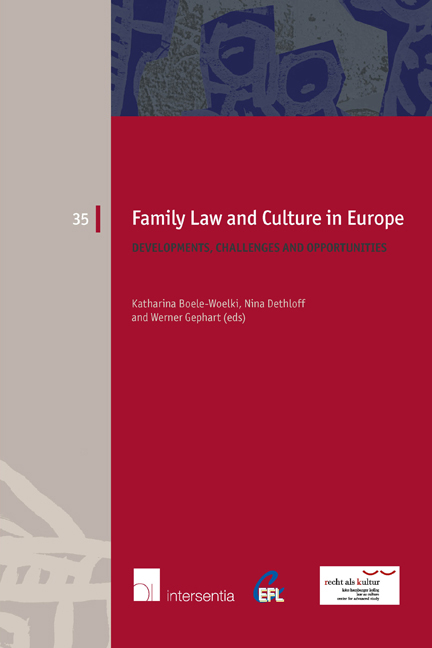Book contents
- Frontmatter
- Preface
- Contents
- List of Authors
- PART ONE THE CEFL PRINCIPLES ON PROPERTY RELATIONS BETWEEN SPOUSES
- PART TWO BREAKUP OF (NON-)FORMALISED RELATIONSHIPS
- Statutory Regulation of Cohabiting Relationships in the Nordic Countries: Recent Developments and Future Challenges
- Legislating for Cohabitation in Common Law Jurisdictions in Europe: Two Steps Forward and One Step Back?
- The Swedish Cohabitees Act in Today's Society
- Maintenance between Former Spouses and Gender Equality
- Collaborative Practice: An Interdisciplinary Approach to the Resolution of Confl ict in Family Law Matters
- PART THREE NEW CONCEPTS OF PARENTAGE
- PART FOUR INTERNATIONAL FAMILY RELATIONSHIPS
- PART FIVE TRANSNATIONAL FAMILIES: ACROSS NATIONS AND CULTURES
- EUROPEAN FAMILY LAW SERIES
Legislating for Cohabitation in Common Law Jurisdictions in Europe: Two Steps Forward and One Step Back?
from PART TWO - BREAKUP OF (NON-)FORMALISED RELATIONSHIPS
Published online by Cambridge University Press: 22 November 2017
- Frontmatter
- Preface
- Contents
- List of Authors
- PART ONE THE CEFL PRINCIPLES ON PROPERTY RELATIONS BETWEEN SPOUSES
- PART TWO BREAKUP OF (NON-)FORMALISED RELATIONSHIPS
- Statutory Regulation of Cohabiting Relationships in the Nordic Countries: Recent Developments and Future Challenges
- Legislating for Cohabitation in Common Law Jurisdictions in Europe: Two Steps Forward and One Step Back?
- The Swedish Cohabitees Act in Today's Society
- Maintenance between Former Spouses and Gender Equality
- Collaborative Practice: An Interdisciplinary Approach to the Resolution of Confl ict in Family Law Matters
- PART THREE NEW CONCEPTS OF PARENTAGE
- PART FOUR INTERNATIONAL FAMILY RELATIONSHIPS
- PART FIVE TRANSNATIONAL FAMILIES: ACROSS NATIONS AND CULTURES
- EUROPEAN FAMILY LAW SERIES
Summary
ABSTRACT
Within Europe, the common law jurisdictions of England and Wales, Scotland and the Republic of Ireland have not taken a unified approach in their legal response to the increasingly common social phenomenon of unmarried cohabitation. Whereas both Scotland and Ireland have recently legislated to provide financial provision remedies as between cohabiting partners on relationship breakdown, in England and Wales (and in Northern Ireland), there are still no family law remedies for financial provision when such relationships break down. This is despite the Law Commission for England and Wales recommending reform in 2007 (see Cohabitation: the financial consequences of relationship breakdown, Law Com No 307, CM 7182, (2007) London: TSO). Interestingly, in the recent Supreme Court decision of the Scottish case of Gow v Grant (Scotland) [2012] UKSC 29, the Supreme Court Justices expressed their frustration at this state of affairs, calling loudly for English law to be changed in line with that of Scotland. Yet so far these calls have fallen on deaf ears. Thus whilst England and Wales has now embraced legal recognition of same-sex marriage, heterosexual cohabitation continues to be regarded by government as a social problem and a threat to formal marriage, with both the Scottish approach to compensating economic disadvantage within cohabitation relationships and an extension of civil partnerships to different-sex couples having been recently rejected once again by government.
Drawing on socio-legal researchevidence and discussion (including the continued existence of the ‘common law marriage myth’), this paper will explore these legal and policy developments in all three jurisdictions against the background of the changing socio-demographic nature of family structures within these societies. It will consider whether the piecemeal legal response to cohabitation in England and Wales provides adequate remedies, given policy objectives, or alternatively whether the Irish and/or Scottish solutions could be appropriately adopted within England and Wales (and Northern Ireland) or indeed, whether a different approach is called for.
INTRODUCTION
At the beginning of the 19th century, Napoleon reportedly said, ‘Cohabitants ignore the law, so the law ignores them’. Love and marriage, according to the received wisdom embedded in popular culture in the mid 20th century, were still felt to go together ‘like a horse and carriage’.
- Type
- Chapter
- Information
- Family Law and Culture in EuropeDevelopments, Challenges and Opportunities, pp. 77 - 94Publisher: IntersentiaPrint publication year: 2014

